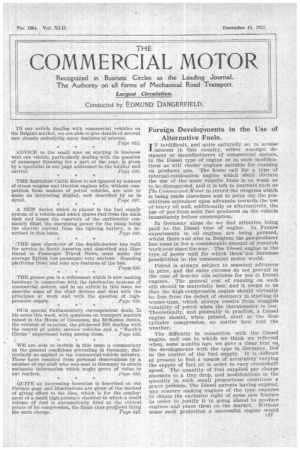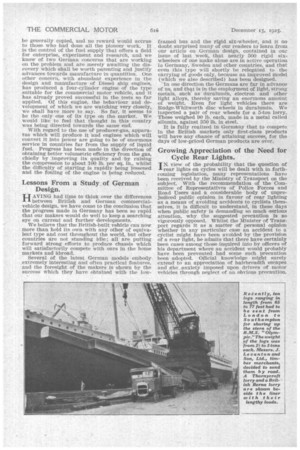Foreign Developments in the Use of Alternative Fuels.
Page 1

Page 2

If you've noticed an error in this article please click here to report it so we can fix it.
T isMifficult, and quite naturally so, to arouse interest in this country, either , amongst designers or manufacturers of comnaercial motors, in the Diesel type of engine or in such modifications as will render engines suitable for running on producer gas. The home call for a type of internal-combustion engine which 'shall obviate the use of the more volatile fuels is so weak as to be disregarded, and it is left to journals such as The Commercial Motor to record the progress which is being made elsewhere and to point out the possibilities attendant upon advances towards the -use of heavy oil and, additionally or alternatively, the use of gas from solid fuel produced on the vehicle immediately before consumption.
In Germany alone do we find attention being paid to the Diesel type of engine. In France experiments in oil engines are being pursued, whilst there and also in Belgium the gas-producer has come in for a considerable amount of research work ever since the war. The Diesel engine is the type. of power unit for which there are immense Possibilities in the commercial motor world.
Petrol. is always subject to seasonal advances in price, and the same excuses do not prevail in the case of heavier oils suitable for use in Diesel engines. The general cost of running on such oils should be materially less; and it seems to us that the high-compression engine should virtually be free from the defect of obstinacy in starting in winter-time, which always results from sluggish volatility of petrol when the thermometer is low. Theoretically, and generally in practice, a Diesel engine should, when primed, start at the first cylinder compression, no matter how cold the weather.
The difficulty in connection with the -Diesel engine, and one to which we think we referred when, some months ago, we gave a clear hint on the developments with the type in Germany, lies" In the control of the fuel supply. It is difficult at present to find a means of accurately varying the supply of fuel oil in order to vary crankshaft speed. The quantity of fuel supplied per charge amounts to a tiny drop, and modifications in the quantity in such small proportions constitute a grave problem. The Diesel patents having expired, any concern making engines of the type requires _ to obtain the exclusive right of some new feature in order to justify it in going ahead to produce engines and place them on the market. Without some such protection a successful engine would c17 he generally copied, and no reward would accrue to those who had done all the pioneer work. It is the control of the fuel supply that offers a field for enterprise, experiment and research, and we know of two German concerns that are working on the problem and are merely awaiting the discovery which shall be worth patenting and justify advances towards manufacture in quantities. One other concern, with abundant experience in the design and manufacture of Diesel ship engines, has produced a four-cylinder engine of the type Suitable for the commercial motor vehicle, and it has already proved successful in the tests so far applied. Of this engine, the behaviour and development of which we are watching very closely, we shall have more to say. So far, it seems to be the only one of its type on the market. We would like to feel that thought in this country was being directed towards the same end.
With regard to the use of producer-gas, apparatus which will produce it and engines which will convert it into power are going to be of enormous service in countries far from the supply of liquid fuel. Progress has been made in the direction of obtaining better volumetric efficiency from the gas, chiefly by improving its quality and by raising the compression to about 100 lb. per sq. in., whilst the difficulty of starting is rapidly being lessened and the fouling of the engine is being reduced.




























